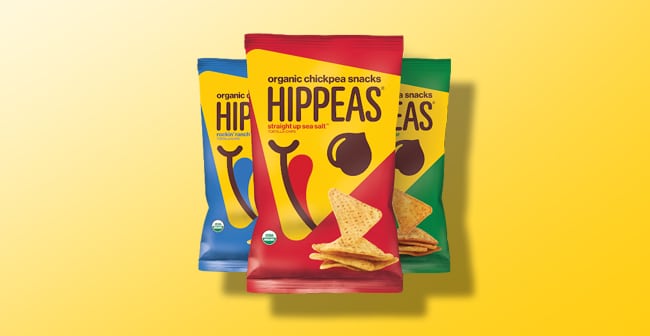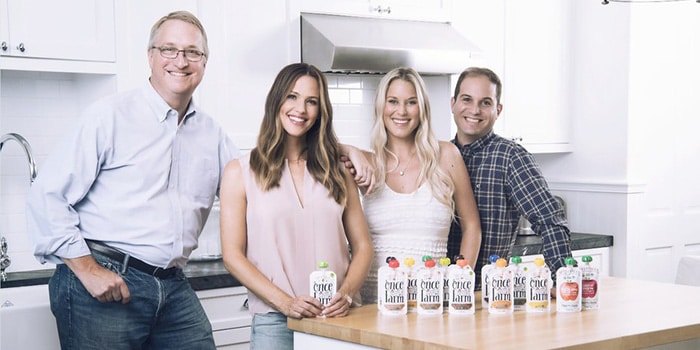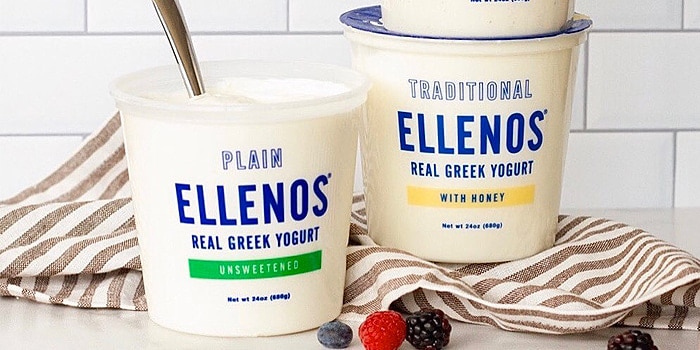NOSHscape: The Latest Food Brand News
Hippeas Producer To Launch Two New Snacks
Over the coming months, Green Park Brands, the producer of Hippeas, will launch Maverick Snacks and CO Chocolate, a pair of new brands aimed at giving the parent company a foothold in three new categories: crackers, cookies and confection.
Maverick and CO will bring Green Park’s portfolio to six total brands, joining Reel toilet paper, Hippeas, Ugly Water (a joint venture with the beverage brand’s founders) and Buddy Nutrition. According to Green Park CEO and founder Livio Bisterzo, both of the new brands meet the criteria of exploring large categories that can be disrupted with better-for-you offerings.
Maverick Snacks will debut in April in Whole Foods stores nationwide; the retailer has a six month exclusive on the line. CO will likely make its trade debut later this Spring.
Mavericks will launch with 8-packs of single-serving bags of cookies (in Birthday Cake, Chocolate or Chocolate Chip flavors) and crackers (in Pizza, Cheese and Plain flavors) with an MSRP of $7.99. Each offering has a core better-for-you callout, emphasizing low-sugar for the cookies and whole grains for the crackers. The goal is to target two lunchbox staples, Goldfish and Chips Ahoy, with similar flavor profiles but better-for-you messaging that can appeal to both natural or mainstream shoppers.
The brand may be familiar to some. In early 2019, Green Park initially launched the line in the U.K., featuring five offerings: Poppin’ Corn, Breadkicks (bite-sized breadsticks), Smart Cookies, and Lil’ Brix (fruit snacks). After debuting as a direct-to-consumer product before moving into retailers, Maverick subsequently ceased operations abroad.
President and general manager Christian Quie, who joined the company in January 2019, said that although the product could have continued on, the Mavericks team saw a stronger initial future for the brand in the U.S. and didn’t want to divide its attention.
The U.K. test has helped shape the U.S. rollout. Most notably, the brand has trimmed the offerings down to two categories, selected because both crackers and cookies often share a category manager, category reset schedule, and promotional plan, Quie said, making these an “efficient” first launch pair. Green Park also realized the difficulty of merchandising small single-serve packs, switching to multiserve packaging that also better suits the larger American pantry. Direct-to-consumer has also gone by the wayside, but may return later.
The retail strategy will be similar to the one the company followed with Hippeas, with an initial launch partner in Whole Foods and a longer exclusive period then many brands to give the brand time to refine the concept and build brand equity, Quie said.
While not yet officially on the market, CO is expected to be presented to the trade later this spring. Former KIND SVP of field sales Joanne Bolonda has been named as the brand’s president and general manager.
Each bag of CO will contain a mix of sugar-free, plant-based discs in white chocolate, dark chocolate or milk chocolate that have been panned, or coated, in one of ten flavors: Key Lime Pie, Almond Sea Salt, Pretzel, Cinnamon, Toasted Coconut, Pineapple Habanero, Strawberry Lemon Chia, Blood Orange and Quinoa Crunch. The disks will use a base of cashew butter and will be sweetened with chicory root fiber and inulin — which also contributes to a total of 14 grams of fiber per serving. Each 3 oz. bag will likely have an MSRP between $5.99 and $6.49.
Once Upon a Farm Grows Up to ‘Help Out the Lunch Box’
Like its consumers, Once Upon a Farm (OUAF) is growing up. The fresh-focused kids CPG brand is launching a new line of non-dairy yogurt and bottled protein smoothies, both moves aimed at helping the brand expand its appeal beyond babies to families.
The yogurt, which will hit retailers in May, will launch in Strawberry, Blueberry and Raspberry flavors in 3.2 oz pouches that will retail for $2.79 each. The 6 oz smoothies, which launched last month, retail for $2.99 in four varieties: Banana Berry, So Strawberry, Red Raspberry and Perfectly Pineapple. Both products are nut free and school safe, and utilize pumpkin seed protein.
Co-founder and actress Jennifer Garner, herself a mother of an 8, 11 and 14 year old, has been eager for the brand — which includes HPP baby food, fruit and veggie pouches, smoothie pouches and apple sauce in its existing product range — to age-up and “help out the lunch box.” With this goal in hand, given that many of its existing products were already sold out of the dairy category, yogurt seemed like the right next step, co-founder and CEO John Foraker said.
The $2.4 billion yogurt category has experienced flat sales over the last year, he noted. However, he added, there are bright spots with both plant-based offerings — which the company said represents 3%-4% of yogurt and is growing 25% year-over-year — and children’s offerings — which represents 10% of the category and is growing by 7% — seeing momentum.
The launch of the yogurts follows the brand’s introduction of a bottled smoothie line last month at 2,500 retailers including Target and Kroger. The products have a thinner consistency than OUAF’s pouched smoothies, allowing for easier drinking, and the addition of protein.
Expanding to a new target is never without risks, but according to Foraker, research showed that a “significant” amount of adults and older children were already consuming the brand’s products. He added that the company’s established brand equity and solid sales base ($20M of trailing 12-month consumption) also showed the brand was ready.
Tofurky Expands Further Into Plant-Based Dairy with Moocho
Having built a significant portfolio of meat-alternative offerings, Tofurky is now looking to tackle the dairy set, announcing today that sub-brand Moocho will be spun off into a more clearly independent brand, with rebranded packaging. To further build out Moocho’s presence on shelf, the company will also launch new dairy-free cheese shreds and dairy-free cream cheese spreads under the brand.
The shreds will launch in Cheddar, Mozzarella, and Fiesta Blend while the spreads will be available in Garden Vegetable, Plain and Strawberry. Both use a base of fava bean protein and coconut oil, with the shreds including fermented cultures and the spreads containing fermented soymilk to assist with a more “cheesy” taste.
Tofurky launched Moocho last year at Natural Products Expo West as a line of non-dairy cheesecakes. The products originally used both the Tofurky and Moocho brand names on its packaging. However, after expanding to 650 retailers including Sprouts, the company realized Moocho needed to be a standalone brand, CEO Jaime Athos told NOSH. Although the association with Tofurky may have helped draw in shoppers, he said, it also created confusion and a more “cluttered” front of pack.
“Consumers [thought] the Tofurky brand represented savory flavors and high protein meat alternatives,” Athos said. “A lot of [new shoppers] don’t really have a great understanding of what Tofurky represents or how long we’ve been around. So Moocho has to not just lean on that Tofurky relationship, it has to stand alone.”
Another reason for a new brand is that the Tofurky name — and what it stands for — may not resonate with Moocho shoppers. While consumers often turn to meat-alternatives for moral and ethical reasons, such as avoiding harming animals or minimizing environmental impact, Moocho is targeting a wider base of shoppers who cannot consume dairy for health reasons.
For now, the company has no plans to produce a non-dairy yogurt or fluid milk, but rather will focus on dairy alternatives that compliment Tofurky’s existing products — think deli meat and cheese. By doing so, Tofurky and Moocho can also offer food service locations a one-stop solution: rather than having to buy meat-analogues from one vendor and dairy-alternatives from another, restaurants can simplify with one partner.
Athos added that while buzzy plant-based burgers have proved there is interest in meat alternatives, he believes restaurants will soon want other menu options as well and Tofurky is well positioned to answer those needs.
KIND Founder Backs Cult Yogurt Brand Ellenos
Ellenos, a fast-growing premium yogurt brand, in February announced an $18 million investment by Equilibra Partners Management, the family office of KIND founder Daniel Lubetzky.
Ellenos was founded in 2013 as a yogurt bar in Seattle. The company evolved into a packaged line, now sold in over 29 states. In 2018 the company closed $18 million from CPG-focused investment firm Monogram Capital, which resulted in the hiring of CEO John Tucker, who has led brands including Farmhouse Culture, Dave’s Killer Bread and So Delicious Dairy Free.
The money will be used to hire new staff, further build out the company’s two-year old production facility and extend the brand’s reach into other markets, Tucker said. While Ellenos has a presence in over half the country, adding distribution in 20 states alone in 2019, the distribution is scattered with the bulk of its presence on the West Coast and in Texas.
“We’re looking to invest in the brand and get it into [consumers’] mouths in key markets around the country,” Tucker said. “We’re very confident that in the process of doing that, we’re going to see high conversion rates.”
Lubetzky has picked up his own investment pace since stepping down as CEO of KIND in 2019. Late last year he appeared on the television show Shark Tank, making an investment in frozen meal company Tahdah! Foods. Formed in 2018, Equilibra takes minority stakes in packaged food and beverage companies, with a bent towards those that are impact driven. Other investments listed on the family office’s site include Justin’s, KRAVE, gimMe snacks, and Chapul.
Ellenos, Tucker said, has many similarities to KIND and the team believes Lubetsky will be of particular assistance as the brand focuses on scaling and emphasizing its message of simple, clean ingredients.
Tucker and co-founder Con Apostolopoulos told NOSH that one thing the brand is very comfortable with is maintaining its premium price point, comparing the brand to that of Ben & Jerry’s or Haagen Daaz in the ice cream set. The company also has no plants to enter the plant-based dairy set, seeing enough white space with its current product lineup. Despite Greek yogurt losing share over the past year, Tucker and Apostolopoulos believe by creating an indulgent product line the company has more legs — serving as either a snack, meal or dessert.
“I believe Ellenos yogurt creates a whole new occasion to be eaten as a snack, as a dessert, from morning to night…It’s the first true super premium yogurt,” Tucker said. “We’re just taking the category to another level, and that’s what’s most exciting to me. So is the time right? I’d say it’s as right as anything else when you have lightning in a bottle.”


Receive your free magazine!
Join thousands of other food and beverage professionals who utilize BevNET Magazine to stay up-to-date on current trends and news within the food and beverage world.
Receive your free copy of the magazine 6x per year in digital or print and utilize insights on consumer behavior, brand growth, category volume, and trend forecasting.
Subscribe


